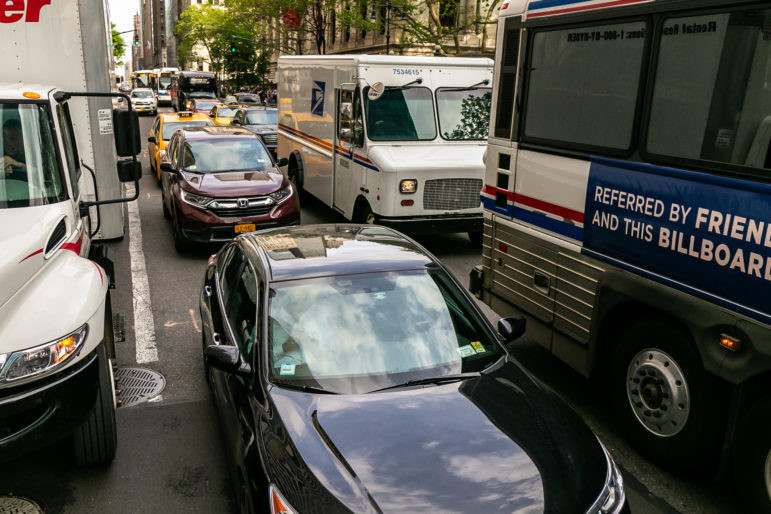After the city suffered deadly flooding from the remnants of Hurricane Ida, Gov. Kathy Hochul promises a new era, signs off on climate legislation and launches climate justice fellowship.

Adi Talwar
Friday evening traffic heading West on 42nd Street between 5th and 6th Avenues in Manhattan.Just over two weeks after being sworn in as governor of New York, Kathy Hochul has signed into law a bill aimed at reducing the state’s car emissions.
The legislation (A.4302/S.2758) requires that all new passenger vehicles sold in the state be zero-emission models by 2035, while new medium- and heavy-duty trucks must be zero-emission by 2040.
The bill passed the state Assembly and Senate in April, and is one of the first major climate-focused legislative actions signed into law since the passing of the Climate Leadership and Community Protection Act in 2019, which aims for the state to reduce its greenhouse gas emissions by 85 percent by 2050.
This law comes at a time when New Yorkers are buying larger vehicles, such as SUVs, which a recent Harvard study showed lead to more premature deaths from pollution. Ownership of SUVs increased more than 20 percent in New York City between 2016 and 2020, according to data from the Department of Motor Vehicles.
“This legislation is a huge leap forward in reducing air pollution from New York’s transportation sector,” said Echo Cartwright, climate mitigation director for The Nature Conservancy, in a statement.
The governor also announced she would award 150 climate justice fellows funding totalling up to $6 million over three years, through the New York State Energy Research and Development Authority. The funding would support training, professional development and mentoring of fellows as they work on climate justice or clean energy projects.
The program aims to support those from disadvantaged populations, including people residing in environmental justice communities, as well as veterans, Native Americans, and low-income, homeless, or formerly incarcerated individuals. Applications are open until 3 p.m. on October 28.
Both announcements come in the wake of devastating flooding in New York City, from the remnants of Hurricane Ida. The floods killed over a dozen people in the city and caused damages in multiple neighborhoods, prompting President Joe Biden to declare a “code red” on climate change during a visit to affected neighborhoods earlier this week.
During a press conference on Sept. 2, Hochul promised “a different era of collaboration” dealing with the climate crisis going forward. “Because of climate change, unfortunately this is something we’re going to have to deal with with great regularity,” she said. “We want to assure all New Yorkers that we’re prepared for this and we’ll do everything we can in our power to protect human life and property.”
In response to her statements, New York Renews, a coalition of more than 15 nonprofits, unions and climate action groups, published a letter urging the governor to consider, among other measures, the Climate and Community Investment Act, which would tax major polluters and invest in environmental justice neighborhoods.
“You have an opportunity to make New York the leader for climate, jobs and justice,” the letter said.
The city’s Department of Transportation this week also unveiled a plan to expand the number of electric vehicle charging stations across the five boroughs, with the goal of installing at least 80 fast-charging plus in the next four years.
Transportation accounts for nearly 30 percent of the city’s overall emissions, according to the DOT, and 400,000 local car owners will need to switch to electric vehicles by 2030 to meet the city’s own climate goals, officials said.
Liz Donovan is a Report for America corps member.










2 thoughts on “Gov. Hochul Signs Bill Restricting NY Car Sales to Zero-Emission Vehicles After 2035”
That’s great for the cities. Out here in the small towns of NYS, We don’t have charging stations. If you read the science about large batteries, the damage to the environment is far worse than gas. The new sythetic fuel I think is a better idea. Made from plants. Justy thoughts.
Some communities are working toward making this a viable option. We will have energy independence for the most expensive energy consuming item that we all own. In the upstate area we have The Village of Solvay Public Library and The Fayetteville Free Library with the ability for patrons to top up their batteries while learning.
https://www.facebook.com/fayfreelibrary/posts/10161494050119488